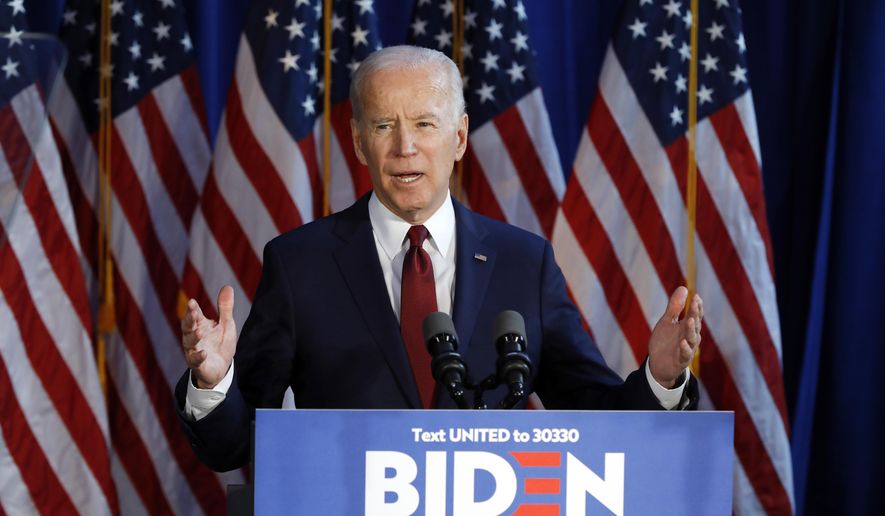OPINION:
We haven’t heard much lately from former Vice President Joe Biden who, practically everyone presumes, will be facing off against Donald J. Trump later this year. The coronavirus pandemic has allowed him to fly pretty much below the radar ever since he dispatched Vermont Sen. Bernie Sanders from the race just about eight weeks ago.
He can only stay there for so long. Some folks, particularly those Democrats who are part of the “resistance,” might like him to remain out of sight as much as possible so they can make the election all about President Trump. That might work on television but in real life, the voters are unlikely to cast a ballot for someone they haven’t seen in a while — though it has happened. He’s got to let the voters know where he stands on the issues of the day and what he’d do that would differ from the fellow he wants to replace in Oval Office.
As good a place for him to start as any would be to clarify his policy on U.S.-China relations, something that has occupied his interest for some time. Remember, it was only a few months after the United Nations had voted to withdraw recognition from Taipei and give it to Beijing that Mr. Biden entered the U.S. Senate.
As a longtime member and eventually chairman of the Senate Foreign Relations Committee, Mr. Biden’s been a key player in the deals and decisions that led the U.S. government to also recognize Beijing, to bring China into the World Trade Organization, and to approve the trade deals that saw jobs and essential elements of the U.S. critical supply chain relocate from our shores to theirs.
In 2000, when he was pushing for normalized trade relations with China — in another of what President Trump has labeled “a bad trade deal” — Mr. Biden said he did not “see the collapse of the American manufacturing economy, as China, a nation with the impact on the world economy about the size of the Netherlands’ suddenly becomes our major economic competitor.”
There’s a good argument to be made that as both as a senator and as vice president, Mr. Biden was an advocate for the outsourcing of critical U.S. industry to China. When it came to exporting U.S. jobs, he was a cheerleader, playing to the Wall Street crowd making money instead of those on Main Street, USA who were soon going to find themselves looking for work. He has a lot to answer for.
Much of what we’ve heard from him has been written off by his allies on the left as China-bashing. Mr. Biden’s also attacked the president, saying his Jan. 31 decision to restrict travel from China to the United States was a result of his acting “irrationally” and accused him of racially motivated “hysterical xenophobia and fearmongering.” Mr. Biden also claimed Mr. Trump made no effort to get medical experts into China, something even the left-leaning PolitiFact said was mostly false as it was China that resisted attempts by the Trump administration to send experts into the country.
What we haven’t heard from Mr. Biden is what he’d do to bring the Chinese to heal, operate by the same rules as most of the rest of the world, and hold them accountable for releasing the COVID-19 virus on the rest of us and then keeping quiet about it as they rushed to corner the market in personal protective equipment and other essential supplies.
It’s fair to ask whether he’ll continue to allow China unfettered access to U.S. credit markets, if he’ll take a strong stand against Beijing’s pursuit of critical U.S. trade secrets by essentially extorting corporate intellectual property from any company that wants to do business there, and what he’ll do to encourage manufacturers making goods vital to America’s supply chain to relocate their operations to other countries.
He hasn’t said enough about any of this. President Trump is talking about it a lot, perhaps not enough for our tastes but it’s still early. Nonetheless, the American people want to know what is going to be done to make China pay. There are people inside the administration and in Congress already looking at these issues, so it’s fair to ask the former vice president when we can expect to hear even an outline of his plan. Or whether he intends to pursue business as usual, or more accurately as it was if he gets into office. The voters have a right to know what his approach will be so they can make an informed choice.




Please read our comment policy before commenting.